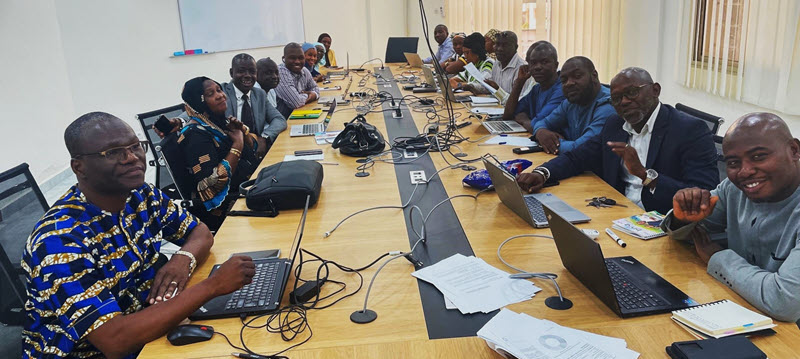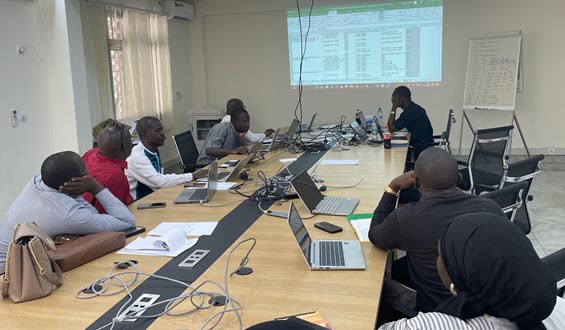Version française - Versión española

UNCTAD organised a workshop on DMFAS’ analytical functionalities in Conakry, Guinea, from 10 to 22 March 2024. Twenty-two debt officers from the Front, Middle and Back office of the debt office (Direction Nationale de la Dette et de l’Aide Publique au Développement, DND-APD) of the Ministry of Finance were trained on DMFAS’ analytical functionalities. This included training on the calculation of debt indicators, average terms, sensitivity analysis as well as on the interface for the Medium-Term Debt Strategy (MTDS) model of the World Bank and IMF.
The first week concentrated on reviewing and providing comments to the DND-APD’s recently completed debt statistical bulletin and to its draft debt portfolio analysis (DPA) report. The resulting recommendations were incorporated in the revised documents. The mission further clarified some of the concepts related to the documents and presented a method for extracting data to calculate the cost/risk indicators using Excel.
 The workshop continued with calculating present values for certain instruments as well as the grant elements using DMFAS functionalities. This was followed by running sensitivity analysis of the debt portfolio applying various exchange rate and interest rate assumptions. The workshop discussed different forecasting methods for exchange and interest rates, including the forward markets, interest rate parity theory and purchasing power parity theories. It was recommended to carry out sensitivity analysis in concert with analysts of the macroeconomic divisions of the ministry and of the Central Bank, who routinely work on such forecasts.
The workshop continued with calculating present values for certain instruments as well as the grant elements using DMFAS functionalities. This was followed by running sensitivity analysis of the debt portfolio applying various exchange rate and interest rate assumptions. The workshop discussed different forecasting methods for exchange and interest rates, including the forward markets, interest rate parity theory and purchasing power parity theories. It was recommended to carry out sensitivity analysis in concert with analysts of the macroeconomic divisions of the ministry and of the Central Bank, who routinely work on such forecasts.
UNCTAD also organized a side videoconference with Mr. Rhassane Marhoum, head of the external debt management department of the Moroccan Ministry of Finance, reviewing the debt portfolio analysis report as a follow-up to the workshop on the elaboration of the DPA he co-delivered in November 2023.
In parallel, the mission conducted a quality check of the DMFAS database, which revealed little to no errors in the data, thus confirming the good quality of the database and consequently, of the statistical bulletin.
During the second week, participants were trained on the MTDS interface in DMFAS 6.2. The mission explained the process starting with exporting the data into Excel and creating stylized instruments. This allowed the participants to get a better understanding of the characteristics and composition of the stylized instruments, which reflect groups of loans with similar conditions and repayment profiles. Finally, participants learned how to import into the MTDS tool the aggregated projection of principal, interest and outstanding by stylized instrument generated using the interface embedded in DMFAS.

This is instrumental as the Guinean debt office will shortly receive an IMF Afritac mission which will help them elaborate the debt strategy and wishes to be able to conduct the strategy elaboration independently in the future. At the end of the workshop, the secretary general of the Ministry of Finance distributed the workshop completion certificates.
The next missions to Guinea include a workshop on debt management procedures, the elaboration of job aids and a feasibility study on creating a link with the Guinean IFMIS.
The DND-APD has made remarkable progress since the start of the project, which includes the first-time installation of DMFAS in 2022, the creation of the database and debt statistics and analysis. The database is of good quality and the production of the debt statistical bulletin has become a standard quarterly activity of the debt office, which is also honoring its reporting obligations to the World bank and IMF. The Ministry of Finance is strongly promoting the creation of capacity at its middle office to face upcoming challenges as the country’s status has been upgraded from low income to lower-middle income category in 2023, limiting access to concessional resources and opening access to financial markets, with more demanding requirements for reporting and transparency.